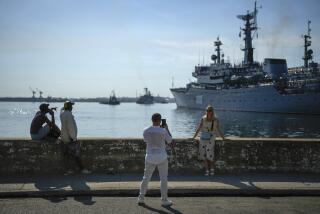Russia seeking inroads among Latin nations
- Share via
LIMA, PERU, AND BOGOTA, COLOMBIA — Russian President Dmitry Medvedev arrived in Venezuela on Wednesday to boost economic and political ties, his latest stop on a Latin American tour coinciding with President-elect Barack Obama’s preparations to take office.
Along with earlier visits to Brazil and Peru, the trip to Caracas reflects a strategy to re-engage a region that Russia largely has ignored since the fall of the Soviet Union. Venezuela has purchased more than $4.4 billion in arms from Russia, which in turn has committed huge sums for energy exploration in Venezuela.
Medvedev’s red-carpet welcome at Caracas’ Maiquetia airport followed Tuesday’s arrival of four Russian warships, including the nuclear-powered Peter the Great missile cruiser, in the Venezuelan port of La Guaira. It was the most significant appearance of Russian military assets in the hemisphere since the 1962 Cuban missile crisis.
The Russian ships are to participate in joint military exercises with Venezuelan vessels and aircraft starting next week. Medvedev and Venezuelan President Hugo Chavez will review the Russian ships today.
“We share a common desire for a multipolar world, not a unipolar one,” Medvedev said Wednesday night in an appearance with Chavez at the Miraflores presidential palace. The leaders signed seven trade accords, including one covering nuclear energy development.
Earlier Wednesday, Medvedev was in Brazil to sign accords with President Luis Inacio Lula da Silva, including a sale of 12 Russian helicopters. The Russian president’s next stop is Cuba, which is also seeking Russian reengagement. The two nations downgraded ties after the breakup of the Soviet Union.
Analyst Sarah Mendelson of the Center for Strategic and International Studies, a Washington-based think tank, sees political brinkmanship in Med- vedev’s presence. It sends a clear signal to Obama that Russia is capable of answering U.S. forays in Moscow’s sphere of influence, such as Washington’s support for Georgia and proposed placement of anti-missile systems in Poland and the Czech Republic, she said.
“The Russians are telling Obama that if he follows what Moscow sees as the provocative approach of President Bush, there will be consequences,” said Council on Foreign Relations fellow Jeff Markoff.
But Medvedev’s ability to make deals in Latin America may be crimped by the global financial crisis and Russia’s declining oil revenue, Markoff added.
Latin American nations’ desire not to get off on the wrong foot with Obama may also work against sensitive agreements, Brookings Institution research analyst Igor Danchenko said.
A factory planned near Caracas that will produce Russian-designed rifles has raised concerns on the part of Colombian President Alvaro Uribe that they could end up in the hands of the FARC, the leftist rebels with close ties to Chavez. That prompted a visit to Bogota last week by Russian Foreign Minister Sergei Lavrov, who assured Uribe, a close U.S. ally, that all arms sales to Venezuela were defensive in nature.
Medvedev went to Brazil after visiting Peru as part of the 21-nation Asia-Pacific Economic Conference forum in Lima.
One Lima-Moscow accord will have Russia installing a plant for repair of about 60 Russian-made helicopters in the Peruvian military fleet.
“Russia is looking to consolidate its relations in Latin America, largely forgotten since the fall of the Soviet Union,” Medvedev said during a meeting with Peruvian President Alan Garcia.
--
Special correspondent Mery Mogollon in Caracas contributed to this report.
More to Read
Sign up for Essential California
The most important California stories and recommendations in your inbox every morning.
You may occasionally receive promotional content from the Los Angeles Times.










